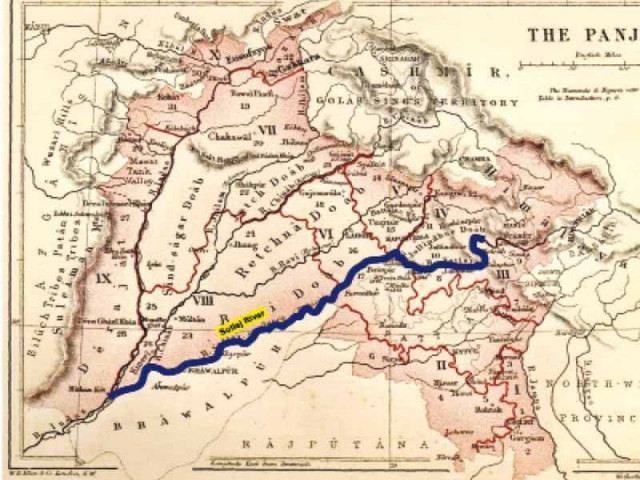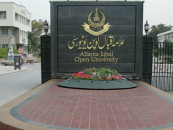Punjab’s role in Pakistan’s Freedom Movement
While the political awakening for a separate identity had started in Bengal in 1906, it gained momentum in Punjab.

Punjab’s role in Pakistan’s Freedom Movement
Had those who succeeded the Quaid after his death not deliberately delayed approval of a new constitution, the nexus between the British-trained civil-cum-khaki bureaucracy and the remnants of the rural elite created by them in the form of Unionist Party that ruled Punjab before Partition along with a few opportunists from Muslim-minority states, would never have succeeded in derailing the democratic process.
While the political awakening for a separate identity had started in Bengal in 1906, it gained momentum in Punjab, under the dynamic leadership of Allama Iqbal. Bengal represented a state with an overwhelming Muslim majority, where the Muslim League had gained a foothold. In Punjab, a Muslim majority province, the Unionist Party — a conglomerate of Muslim and Hindu feudal — ruled.
By 1926, Muslim leaders of Punjab decided to unite on one platform and reconstitute the Punjab provincial Muslim League. It was headed by Sir Mohammad Shafi, with Dr Muhammad Iqbal as General Secretary and Malik Barkat Ali as Propaganda Secretary. Towards the end of 1934, in response to appeals from Muslim leaders including Allama Iqbal and Malik Barkat Ali from Punjab, Jinnah returned from England.
The Government of India Act 1935 gave a new impetus to political activity and set into motion process of parliamentary democracy in the subcontinent. The All-India National Congress Party had by then established itself as an organised political party and its central leadership comprised of able politicians.
Muslims however were divided and had not united under the banner of All-India Muslim League to effectively launch a campaign for the forthcoming elections. The Masjid Shaheed Gang issue created a stir amongst Muslims in Punjab, when the mosque was demolished on July 4, 1935 by Sikhs, under the protection of the police and the army, and a Unioinist government which included men like Feroze Khan Noon, Nawab Muzzafar and Chaudhry Shahabuddin, the president of Punjab Legislative Council.
Jinnah came to Lahore on April 29, 1936 to organise the Punjab Provincial Election Board. He approached Mian Fazle Hussain, the leader of Unionist Party, to extend support to Muslim League candidates in the forthcoming elections, but Hussain declined.
On May, 1936, Jinnah then went to meet Allama Iqbal who assured his wholehearted support for the formation of a parliamentary board. On May 8, 1936, a joint press statement was issued by Allama Iqbal, Malik Barkat Ali, Khalifa Shujauddin and Pir Taj Din announcing support for Jinnah.
The Punjab Muslim League decided to make preparations for a meeting of the All-India Muslim League Council to be held in Lahore in June that year. On May 21, 1936, Jinnah announced from Srinagar the constitution of the Central Parliamentary Committee comprised of 56 members from all over India, with 11 members from Punjab.
After the death of Sir Fazle Hussain on July 9, 1936, Sir Sikandar Hayat Khan - who was serving the Raj as Deputy Governor of the Reserve Bank of India - resigned on December 30, 1936 to assume charge of the Punjab Unionist Party.
The Governor of Punjab, Sir Herbert Emerson appointed him as Member Revenue. Sikandar was now not only the leader of the Unionist Party, but also held the highest government office, second only to governor. All this was done to secure a victory for the Unionist of Punjab, in the 1937 elections. In October 1936, the Punjab Muslim League had invited applications for those seeking tickets for the forthcoming elections. But, unfortunately, the Punjab Muslim League had its affiliation with the national party cancelled by a committee headed by Nawab Liaquat Ali Khan, on April 5, 1936, to accommodate Sir Sikandar Hayat Khan.
On April 18, 1938, the All India Muslim League, in its session held at Calcutta, dissolved the Punjab Provincial Muslim League, for which Iqbal had dedicated his life and constituted a new League with 25 nominees of Sikandar Hayat and 10 belonging to the Iqbal faction of the League.
The Unionist Party had openly opposed the Muslim League in the June 1936 session held at Lahore. This dark chapter disenchanted Muslim League loyalists, and brought to the fore the Unionists of Punjab, who were toadies of the British Raj. These remnants of the Raj continue to haunt the politics of Pakistan, especially of Punjab, even today.
The Jinnah-Sikandar declaration which was never signed by Jinnah, was based on a promise by Sikandar, that all Muslim members of the Unionist Party would join the League and sit in the assembly as part of Muslim League. He also promised to submit signed affidavits declaring their allegiance to Muslim League and Jinnah. This was just a ploy to overcome the difficulties he was facing in retaining his hold on the premiership of Punjab.
Although Sir Sikandar pledged his support to Muslim League in All-India political matters, on a number of occasions he betrayed the League’s stand vis-a-vis the British. In a letter, written by Iqbal to Jinnah dated November 10, 1937, the poet said “I am now definitely of the opinion that Sikandar wants nothing less than complete control of the League and the provincial parliamentary board. All this in my mind amounts to capturing the League and then killing it. Knowing the opinion of the province as I do, I cannot take the responsibility of handing over the league to Sir Sikandar and his friends. The pact has already damaged the prestige of the League in this province.”
Published in The Express Tribune, August 14th, 2011.



















COMMENTS
Comments are moderated and generally will be posted if they are on-topic and not abusive.
For more information, please see our Comments FAQ